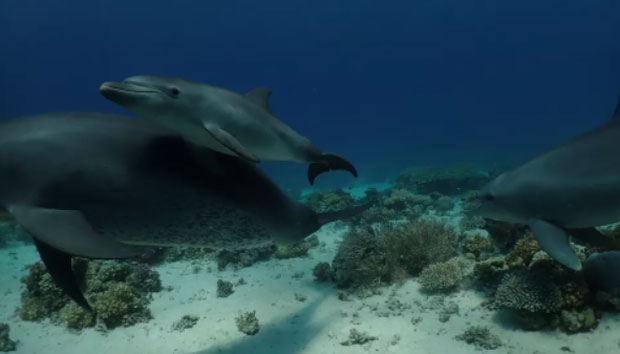“Dolphin skin” was once a trending term among beauty bloggers to describe smooth, radiant skin. However, these marine animals do not possess such a marvelous layer of skin solely due to genetics.
It turns out that the Indian Ocean bottlenose dolphin is one of the few species in nature that exhibits skincare behaviors similar to humans. Scientists have discovered that they have a habit of rubbing their smooth skin against certain types of coral and sponges to protect their skin from infections.

Dolphins are famous for their radiant, smooth skin that many beauty bloggers envy.
According to observations made 13 years ago, dolphins rub their smooth skin against coral in the Red Sea off the coast of Egypt. The type of coral they use for their “skincare” is a type of soft coral.
Researchers suspect that they do this because soft corals (or gorgonian corals) secrete a type of mucus containing antimicrobial compounds. In addition to gorgonian corals, they have also identified many other coral species with similar properties.
In a recent study published on May 19, scientists indicated that these compounds are beneficial for dolphin skin. By continuously coating their skin with these substances, dolphins can prevent and combat skin infections, maintaining a healthy microbiome.
From boat observations and scuba diving, many intriguing behaviors of dolphins have also been discovered. They line up to enter the coral “spa,” taking turns to perform their “skincare.” As they rub against the soft coral layers, their skin gets coated in a greenish-yellow compound.
Young dolphins (under one year old) closely observe the activities of their older peers and gradually learn how to rub against the coral. Initially, they will only lightly touch it before quickly swimming away shyly. According to researchers, this behavior is a form of social learning rather than an innate skill.

Young dolphins learn behaviors from their older peers.
Analysis revealed 17 bioactive compounds, 10 of which possess antibacterial properties. Some even have antioxidant effects, while others act similarly to estrogen in keeping dolphin skin hydrated and radiant. Additionally, there is a small amount of toxic substance for sterilization purposes.
However, the study is limited as the chemical analyses were conducted in the laboratory rather than on actual dolphin skin. Furthermore, scientists are not certain whether dolphins are intelligent enough to choose corals that are beneficial for their skin.
Nonetheless, the desire for beauty and self-care from the smallest details does not seem to be an “exclusive” trait of humans.


















































